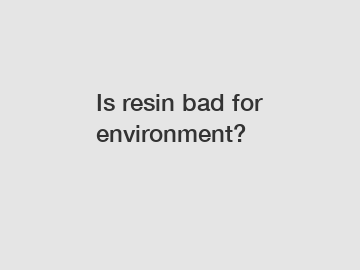Is resin bad for environment?
HW are exported all over the world and different industries with quality first. Our belief is to provide our customers with more and better high value-added products. Let's create a better future together.
Is Resin Bad for the Environment?
Resin has become a popular material in many industries, including crafts, construction, and manufacturing. It is versatile, durable, and relatively easy to work with. However, there is growing concern about the environmental impact of resin production and use. In this article, we will explore the question: Is resin bad for the environment?

What is resin?
Resin is a synthetic material made from a combination of chemicals, typically derived from petroleum. It can be liquid, solid, or semi-solid and is commonly used as a coating, adhesive, or composite material. Resin is known for its strength, clarity, and resistance to chemicals and weather.
How is resin harmful to the environment?
1. Production process: The production of resin involves the extraction and refinement of petroleum, which is a non-renewable resource. The process of drilling for oil, transporting it, and refining it into resin releases greenhouse gases and other pollutants into the atmosphere.
2. Plastic pollution: Many resins are classified as plastics, which contribute to the global plastic pollution crisis. When disposed of improperly, resin products can end up in landfills, rivers, and oceans, where they can harm wildlife and ecosystems.
3. Chemical exposure: Resin contains chemicals that can be harmful to human health and the environment. Some resins release volatile organic compounds (VOCs) into the air, contributing to air pollution. Additionally, the chemicals used in resin production and curing can leach into soil and water, contaminating the environment.
Is there a way to make resin more eco-friendly?
There are efforts being made to develop more sustainable alternatives to traditional resin:
1. Bio-based resins: Some companies are exploring the use of bio-based or renewable materials, such as plant oils or sugars, to create resin. These materials have a lower carbon footprint and are less toxic than petroleum-based resins.
2. Recycling: Recycling resin products can help reduce the amount of waste that ends up in landfills or the environment. Some resins can be melted down and reformed into new products, reducing the need for new resin production.
3. Eco-friendly production processes: Manufacturers can implement more sustainable practices, such as using renewable energy sources, reducing waste, and minimizing chemical use, to lessen the environmental impact of resin production.
Overall, while resin does have negative environmental impacts, there are steps that can be taken to mitigate these effects and make it a more sustainable material.
In conclusion, resin can be harmful to the environment due to its production process, plastic pollution, and chemical exposure. However, there are eco-friendly alternatives and practices that can help reduce the environmental impact of resin use. It is important for consumers and manufacturers to be aware of these issues and strive to make more sustainable choices.
If you have any questions about eco-friendly resins or are looking for a sustainable resin supplier, feel free to contact us. We are happy to provide information and assistance.
If you want to learn more, please visit our website.
Contact us to discuss your requirements of compostable plastic bags manufacturer. Our experienced sales team can help you identify the options that best suit your needs.



